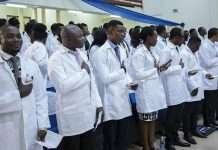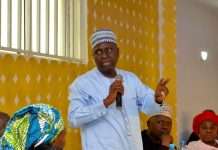
Following the conviction of Dr Ejike Orji for criminal negligence, Ms Adanma Odefa-Wachuku, a Lawyer and Public Health Advocate, says accolades must be showered upon the Lagos State Criminal Justice system for setting this novel precedence.
According to her, the conviction of Orji for criminal negligence arising from his reckless and dangerous practice of medicine is arguably the first time a registered medical practitioner would be so convicted in Nigeria.
Odefa-Wachuku, who spoke with the News Agency of Nigeria (NAN) on Tuesday, said the judgement was a watershed in medical jurisprudence in Nigeria.
“It hopefully opens the floodgate for many more successful prosecutions of reckless and negligent doctors who had hitherto carried on with impunity.
“Orji was to be arraigned and tried before the Disciplinary Tribunal in 2021, for the negligent and poor handling of Somtochukwu Ezi-Ashi, his patient.
“However, three attempts were stalled by his absence on a claim of ill health.
“He further stalled the case by filing an enforcement of fundamental right suit against the Tribunal at the High Court of the Federal Capital Territory.’’
While the professional case stalled at the Medical and Dental Practitioners’ Disciplinary Tribunal, the DPP Lagos State continued with the prosecution of the criminal charge against Orji at the Lagos State High Court.
He was re-arraigned in February 2022, on one count of causing grievous bodily harm to Ezi-Ashi, two counts of endangering human life through reckless and negligent acts and three counts of breach of duty of person doing dangerous acts and endangering human life through reckless and dangerous acts in violation of sections 245, 251(1)(e), 209, 211 and 251(1)(e) respectively of the Criminal Law of Lagos State Cap C17 Laws of Lagos State 2015.
On Jan. 20, 2023, the court entered a verdict and convicted Orji on four of the six counts, and he was sentenced to one year in prison on each of the four counts.
Odefa-Wachuku, who wrote an article on the landmark case , “ The Enforceability of A Doctor’s Duty of Care In Nigeria: The Landmark Case of Dr. Ferdinand Ejike Orji’’, chronicles the genesis of the case.
She said the case emanated from a criminal complaint in 2018 against Orji by the parents of one Somtochukwu Ezi-Ashi, 16-year-old boy, who was a high school student in the United States of America at the time.
“He was on holiday at the time. On the 26th of July 2018, while playing basketball, he fell and sustained injury to his left leg, leading to what was later discovered to be a fracture of one of the bones in his left knee joint.
“He was rushed to Excel C Medical Centre in Ikoyi, Lagos, where Dr Ejike Orji, the Medical Director, sedated him.
“He had a police orderly and a basketball coach who accompanied him to pull the limb in opposite directions before he applied fiberglass on the left leg from the thigh to the toe.
“ He did not bother to get the consent of the child’s mother or x-rayed the leg to determine the nature of the fracture before manipulating the limb and applying the cast.
“Rather, the doctor only sent the patient for x-ray at another facility in Surulere, Lagos, after he had applied the cast.’’
She said: “As the effect of the sedative wore off, the patient started complaining of pain and tightness on the leg where the cast was applied.
“His mother called Dr Orji, who had left the hospital before she returned from the X-ray facility with the patient, to complain of her son’s experience but the doctor told her that the pain would stop within two days.
“On the strength of this assurance, the woman went home with the patient only to return to the hospital the next morning with the patient because he could not sleep during the night due to the pain.
“She requested that the cast be removed but Orji only cut open a square hole in the back of the knee and asked them to go home.
“At home the patient’s mother noticed fluid oozing out from the opened space. So, she took him back to the hospital the following day- July 28, 2018.
“The patient was admitted for one day at the hospital and Orji removed part of the cast.
“Yet, there was no improvement as the limb remained swollen. By this time, the patient had lost sensation in the limb.’’
In her article, Odefa-Wachuku said the father of the victim contacted two orthopaedic surgeons to seek their opinion on what to do for the patient.
It turned out that Ezi-Ashi had developed compartment syndrome precipitated by occlusion of blood supply to the limb for more than 48 hours by the tight cast.
“Six surgical interventions had to be carried out on Somtochukwu Ezi-Ashi at Reddington Hospital, Lagos, before he was flown out to the U.S. where he had several other operations to save the limb.
“The limb was saved but he developed foot drop – difficulty lifting the front part of the foot.
“The Police conducted an investigation and submitted to the Lagos State Director of Public Prosecution (DPP) who filed charges against Dr Ejike Orji in the Lagos State High Court.’’
Odefa-Wachuku went further to explain that aside from the criminal complaint to the police, the patient’s mother also lodged a complaint with the Medical and Dental Practitioners’ Investigation Panel in March 2019 against Orji.
According to her, she alleges the conduct of Orji in the management of her son’s condition is that of negligence.
“The panel conducted an investigation of the complaint from March 2019 through November 2020.
“The investigation involved four other doctors at Excel C Medical Centre, including Dr Ifeyinwa Grace – the paediatrician who had hitherto attended to the patient from his childhood.
“And five doctors at Reddington Hospital who attended to the patient, including Dr Ike Nwachukwu who performed the six surgical operations on him at Reddington Hospital.’’
The complainant and the respondents appeared before the panel where they had the opportunity to clarify affidavit depositions and other documentary evidence including the patient’s case notes they had submitted to the panel.
“The record of proceedings of the investigation obtained by the complainant from the panel shows that members of the panel questioned the doctors extensively on the propriety of their actions in the treatment of the patient.
Odefa-Wachuku in her article said the Panel determined that there was evidence of misconduct in a professional respect against Orji and Nwachukwu and referred each of them to the Disciplinary Tribunal for adjudication.
At the Disciplinary Tribunal, the Panel preferred five counts charge against Orji and on Jan. 20, 2023, the court entered a verdict and convicted Orji on four of the six counts.
He was sentenced to one year in prison on each of the four counts.
Orji appealed at The Appeal Court, Lagos Division, challenging the judgment of a Lagos High Court that sentenced him to one year imprisonment.
Odefa-Wachuku said the judgement showed that the prosecution made copious use of the records of the case they were able to obtain by subpoena from the Medical and Dental Practitioners Investigation Panel in marshalling the medical evidence against the defendant.
“They were able to call as witnesses orthopaedic surgeons who participated in the treatment of the victim after he had developed the complication of compartment syndrome.’’
Relating the commitment and dedication of the medical profession to Ezi-Ashi’s case, Odefa-Wachuku, explained in details the demands of the medical profession in her article.
Quoting The Oxford Textbook of Medicine, she said: “Medicine is described as the science and practice of caring for patients, managing the diagnosis, prognosis, prevention, treatment, palliation of their injury or disease, and promoting their health.
“ Medicine encompasses a variety of practices intended to maintain and restore health by prevention and treatment of diseases.’’
According to her, medicine is an essential part of the human experience.
“This is so because the doctor or one of his several professional aides is usually present at some point in the life of a person from the womb to the deathbed.
“ The profession of medicine evolves as humankind evolves and advances.
“ Advances in the biological and physical sciences have been applied to medicine, leading to great improvements in the longevity and quality of life of people on Earth.
“In the course of providing care to their patients, doctors carry out delicate and dangerous procedures that could very easily go awry.
“ They prescribe medication that could produce a plethora of potentially dangerous side effects.
“Mistakes could cause death and life changing consequences.
“Unqualified practitioners, commonly referred to as quacks, cause great harm to hapless persons who access their service.
“They maim, dispossess and even cause death of these unsuspecting members of the public.’’
Odefa-Wachuku said that medicine had been subject of some forms of regulation or the other from antiquity.
“The Hippocratic Oath of antiquity, Avicenna’s Canon of Medicine of the medieval period, and Thomas Parcival’s Medical Ethics of 1803 are attempts at the regulation of the medical profession.
“These were more or less professional mores enforced by professional societies and medical schools.
“ Developments in the modern era have made it necessary for society to make statutory provisions to tightly regulate the profession of medicine to ensure public safety without impinging on doctors’ ability to practice and advance the profession for the benefit of the society.
“The Apothecaries Act passed by the Parliament of the United Kingdom in 1815 exemplifies this.
“The State makes laws, rules and regulations to control the education and training of persons who seek to become doctors, determine the minimum qualification for registration and a strict code of conduct for practitioners of the profession.
“ Aside from the purely professional provisions, the State also makes laws to deal with persons who practice medicine illegally or in a manner that is careless, reckless and causes harm to members of the public.’’
According to Odefa-Wachuku, in Nigeria, the Medical and Dental Practitioners’ Act (MDPA) is the main piece of legislation for the regulation of medicine. The Federal Parliament first enacted it in 1963.
She explained it was repealed and re-enacted in 1988, and amended in 1992.
“The MDPA established the Medical and Dental Council of Nigeria (MDCN) and vested it with the authority to regulate medical education, registration and licensing of medical doctors and promulgation of a code of conduct for the practice of the profession in Nigeria.
“The MDPA also criminalises the practice of medicine in Nigeria by persons who are not registered as medical practitioners.
“The MDPA also established two other professional bodies for the purposes of disciplining persons registered to practice medicine in Nigeria. They are the Medical and Dental Practitioners’ Investigation Panel and the Medical and Dental Practitioners’ Disciplinary Tribunal.
“The Investigation Panel is vested with the mandate of conducting an interim investigation into any case where it is alleged that a doctor misbehaved in a professional respect.
“If for any other reason, the doctor would be subject of proceedings before the Medical and Dental Practitioners’ Disciplinary Tribunal.
“They review allegations of misconduct against doctors that are not criminal in nature with a view to determining if the evidence suggests that the doctor in question actually acted in a manner that violates the code of conduct for doctors.’’
She said if they made the determination that there was such evidence against a doctor, the doctor would be referred to the Disciplinary Tribunal for trial.
“The panel may make an order of interim suspension of a doctor they have investigated if they are convinced that allowing such a doctor to continue practising poses danger to the public.
“ Where the Disciplinary Tribunal gives a guilty verdict, it could mete out three possible sanctions: admonishment, suspension from the profession and outright erasure from the Medical Register.’’
She, however, said that the verdicts of the Disciplinary Tribunal were subject to appeal before the Court of Appeal and ultimately the Supreme Court.
She cited instances where doctors who had been sanctioned by the Disciplinary Tribunal had severally taken advantage of the right of appeal.
“From as early as 1959 when Dr Alakija had the order of the Disciplinary Tribunal for the erasure of his name from the Medical Register upturned by the Supreme Court to 2001 when Dr Okonkwo had a similar order against him upturned.
“These cases and several other similar ones have helped to expand jurisprudence in professional discipline in Nigeria.
“However, the quests for justice by persons who are aggrieved by doctors’ malpractice have remained mostly unfulfilled especially in criminal justice.’’
Odefa-Wachuku noted that the Laws of the Federation of Nigeria have had the Criminal Code Act since 1916 and the Penal Code Act since 1960.
She said that both statutes had provisions against the careless and reckless practice of medicine in the sections dealing with criminal negligence.
“Nigeria’s socio-political history has advanced significantly from what it was in the colonial and early post-independence days and Nigeria is now a federation of 36 states and a federal capital territory.
“ In pursuance of the provisions of the Constitution of the Federal Republic of Nigeria 1999, the state houses of assembly have passed versions of the Criminal Code Act or Penal Code Act as state laws.
“Very prominent among these is the Criminal Law of Lagos State 2015.’’
On the background of all the foregoing, it is very difficult to find any record of a successful conviction of a registered medical practitioner in Nigeria for a criminal offence arising from their practise of the profession.
She said that one of the reasons for this was the fact that medicine is a very highly technical profession which is extremely difficult for non-doctors to comprehend to the extent of being opaque.
“This necessarily makes it a largely self-regulated profession in most parts of the world.
“ It also means that the determination of wrongdoing against a doctor depends on the professional evidence of his peers.
“ This was amply demonstrated in the trial of Michael Jackson’s doctor, Dr Conrad Murray.
“ In June 2009 Dr Conrad Murray, a cardiologist, administered an anaesthetic agent, propofol, as a drip to Jackson at his home to help him sleep and left him without proper monitoring.
“ Propofol is supposed to be administered by anaesthesiologists and critical care specialists.
“ Murray’s specialty, cardiology, did not confer such specialist skills on him. He was charged with involuntary manslaughter. ‘’
She said: “To convict him, the prosecution had to bring doctors who are specialists in anaesthesiology and critical care medicine to testify in court on what the accepted practice was in the United States.
“After a drawn out trial Dr Conrad Murray was convicted and sentenced to four years in jail.
“ His license to practice medicine was revoked by the Texas Medical Board.
“It had been quite difficult to get such evidence in Nigeria until recently in the case of Lagos State vs Dr. Ferdinand Ejike Orji,’’ she said.
Odefa-Wachuku recalled that Orji was asked several questions like what informed his decision to manipulate the limb without first x-raying it to determine the nature of the fracture but his answers were not satisfactory.
She said that copy of the report of the investigation obtained by the complainant showed that
Orji was a general and paediatric surgeon and not an orthopaedic surgeon.
“ Orji applied fiberglass cast on the patient at Excel C Medical Centre before he was sent for X-Ray elsewhere.
“There is no evidence that appropriate consent was sought and obtained from the patient or his parents by Dr Ejike Orji.
“The patient developed swelling and pain on the left leg after the application of the fiberglass cast and when Orji was informed he only made a square opening in the popliteal area to relieve the pain.
“He ultimately converted the cast to back slab after the father of the patient requested him to remove the cast.
“The patient was discharged from Excel C Medical Centre in a worse condition before his parents took him to other hospitals for treatment.’’
Nwachukwu attended to the patient as an orthopaedic surgeon at Reddington Hospital and made a diagnosis of compartment syndrome.
He treated the patient until he was airlifted for further treatment in the US.
Consequently, Odefa-Wachuku urged other states to borrow a leaf from Lagos and stand in the gap for hapless patients who suffered untold physical pain and mental trauma as a result of reckless negligence in the hands of healthcare practitioners.(NAN) (www.nannews.ng)













